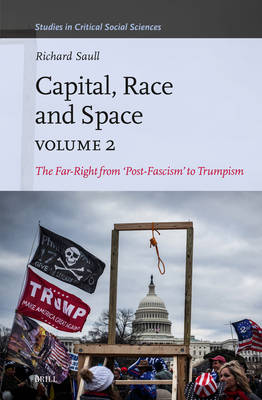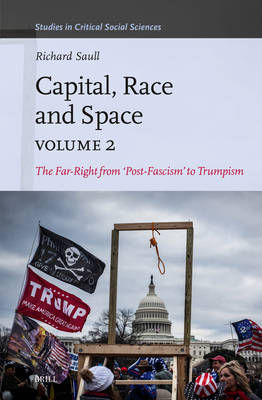
- Afhalen na 1 uur in een winkel met voorraad
- Gratis thuislevering in België vanaf € 30
- Ruim aanbod met 7 miljoen producten
- Afhalen na 1 uur in een winkel met voorraad
- Gratis thuislevering in België vanaf € 30
- Ruim aanbod met 7 miljoen producten
Zoeken
€ 302,45
+ 604 punten
Omschrijving
In this second volume of Capital, Race and Space, Richard Saull offers an international historical sociology of the Western far-right from the end of World War II to its contemporary manifestations in Trumpism and Brexit. Focusing on its international causal dimensions, Saull draws on the theory of uneven and combined development to provide a distinct and original explanation of the evolution and mutations of the 'post-fascist' far-right.
Despite the transformed geopolitical context of capitalist development after 1945 - with decolonization and the end inter-imperial rivalry - the far-right continued to be intimately connected to the consolidation of the anti-communist liberal order. Thereafter, the far-right also formed an important, if contradictory, element within the neoliberal historical bloc that emerged in the 1980s and has been the main ideo-political beneficiary of the 2007-8 neoliberal crisis.
Volumes I and II of Capital, Race and Space were shortlisted for the 2024 BISA IPEG book prize (for best book published in the field of IPE in 2023), and subsequently recognised by the IPEG Book Prize Committee as Highly Commended. The shortlisted books represent the very best of IPE scholarship, cutting across disciplinary boundaries and addressing timely topics.
Despite the transformed geopolitical context of capitalist development after 1945 - with decolonization and the end inter-imperial rivalry - the far-right continued to be intimately connected to the consolidation of the anti-communist liberal order. Thereafter, the far-right also formed an important, if contradictory, element within the neoliberal historical bloc that emerged in the 1980s and has been the main ideo-political beneficiary of the 2007-8 neoliberal crisis.
Volumes I and II of Capital, Race and Space were shortlisted for the 2024 BISA IPEG book prize (for best book published in the field of IPE in 2023), and subsequently recognised by the IPEG Book Prize Committee as Highly Commended. The shortlisted books represent the very best of IPE scholarship, cutting across disciplinary boundaries and addressing timely topics.
Specificaties
Betrokkenen
- Auteur(s):
- Uitgeverij:
Inhoud
- Aantal bladzijden:
- 444
- Taal:
- Engels
- Reeks:
- Reeksnummer:
- nr. 250
Eigenschappen
- Productcode (EAN):
- 9789004539501
- Verschijningsdatum:
- 15/06/2023
- Uitvoering:
- Hardcover
- Formaat:
- Genaaid
- Afmetingen:
- 155 mm x 235 mm

Alleen bij Standaard Boekhandel
+ 604 punten op je klantenkaart van Standaard Boekhandel
Beoordelingen
We publiceren alleen reviews die voldoen aan de voorwaarden voor reviews. Bekijk onze voorwaarden voor reviews.








